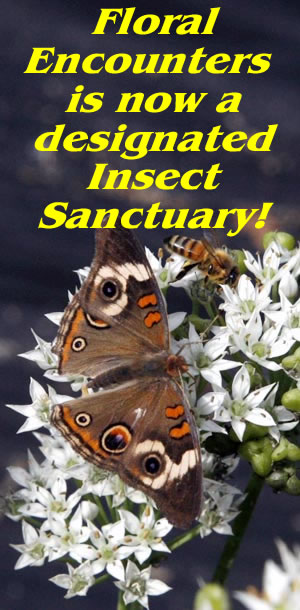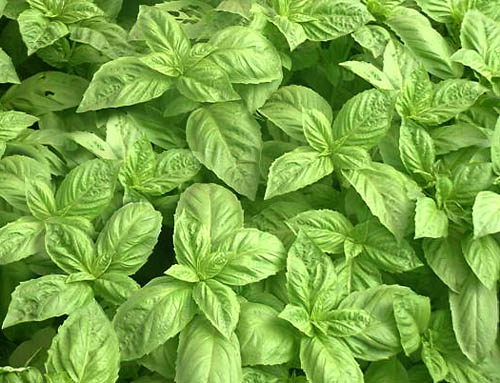What garden is complete without at least one basil plant? This versatile plant is considered the King of Herbs and is the most widely used plant in cooking. It has a very characteristic scent described as spicy and peppery, with a hint of clove and mint, once smelled will most likely not be forgotten. Basil is the most popular of all culinary herbs but also has a lot of medicinal uses.
Description of Sweet Basil (Ocimum basilicum).
Lush annual that can grow to 3 feet in height with upright branching green stems
that are square in cross section. Leaves are bright green ovate with serrated
edges and can be 2-4 inches (5.1-10.2cm) long. Leaves tend to be 'wrinkled'
or puckered towards the central vein. In mid summer the plant puts up tall stiff
flower stalks. These can be up to three feet in length and are composed of flat
green bracts separated by about one inch of bare stem giving the appearance
of flat beads on string. Each bract produces a whole of small white flowers
with deep burgundy stamens. Flowering can last a for several months and is followed
by small brown seeds. In most cases flower stems are removed to increase leaf
production.
Growing Sweet Basil (Ocimum basilicum) from Seed.
All basils are very easy to grow from seed. Follow our general
growing instructions. Keep compost slightly dry at all times but do not
let it dry out entirely. Pot on when seedlings are large enough to handle and
plant out after hardening off.
Basil can easily be grown indoors in pots all year around to ensure fresh herb
for the kitchen. Starting seeds in early spring ready for outdoor planting will
help increase the season length. Seeds can then either be sown throughout the
year in pots if desired or sown directly in the ground once all danger of frost
has passed.
Germination usually takes about 14-20 days depending on temperature.
Location and Care of Sweet Basil (Ocimum basilicum).
Basil is easy to grow from seed but takes a little more care than some other
herbs. It likes full sun, but in very warm sunny areas partial shade is advisable.
It prefers a soil with good organic material for the best lush growth of leaves.
It also likes a pretty rich soil and grows best with a good mulching. The more organic material and fertilizer it gets the richer the leaf growth is. Lush leaves are usually what is required on a basil plant unless its grown as an ornamental. For leaf harvest lots of fertilizer and nitrogen will increase leaf growth and reduce it the likelihood of flowering. If cared for it will produce a multitude of leaves that can be constantly picked for use in the kitchen.
Flowers should be pinched off as soon as they begin to appear if the plant is begin grown for leaves. No basil produces a good crop of leaves after it begins to flower so this must be discouraged. Flowering signals the end of the lifespan so the longer it can be kept from flowering the longer the plant will live. However it is an annual and will rarely live longer than six months in the ground and as little as 3-4 in a pot.
Basil needs more water than many other herbs. Basil is a lush plant and will not tolerate any drought. Daily watering is essential for good productive plants. In times of drought and high heat water more frequently.
When watering try to get all the water at the soil level and not on the leaves. Water droplets on the leaves can act as little lenses and burn the leaves. Avoid splashing the water and soil up on the leaves as this can promote fungal molds. An ideal way to water basil in the ground is by using a soaker hose. This allows water to reach the roots without getting any on the leaves and its easier for the gardener so all you need to do is turn on the hose once a day. Or you can get a timer and let it be watered automatically.
Basil is a tender plant and will not tolerate frost. As soon as the weather turns cold the leaves begin to turn black. In areas where there is not frost the plants can live for two or more years. Basils can tolerate slightly acidic soils. If the pH is lower than 6.5, add a dressing of lime when preparing the soil.
Basil is a great addition to any flower bed as the bright green leaves and exotic look of the plant add interest and can be a very nice backdrop for other flowering plants. To keep basil at it's best for leaf production pinch off the flower stalks as they arise. This may be an ongoing process if the plant is happy as it will want to flower. However flowering will reduce leaf production and pinching encourages the plant to branch and produce even more leaves.
Plant spacing and airflow.
Allow plenty of air space around your basil plants. IF growing a row keep plants
at least 2 feet apart. If growing in a border keep other plants back slightly
to allow for airflow. Don't grow Basil in areas where there is little airflow.
Basil can be highly susceptible to fungal molds and allowing good airflow around
the plant can greatly reduce the likelihood of this happening to your plants.
Keep chemicals away from your basil.
Don't grow Basil in a area where it could be sprayed by chemicals, if you use
chemicals on your lawn ensure that your basil plants are not right next to it.
Try not to grow it near your property boundary where chemicals used by your
neighbor may land on your plants. Always wash the leaves well before eating.
Great of decks, boxes and hanging baskets.
Basil is a very versatile plant and can be grown in hanging baskets, pots and
even on the windowsill offering fresh basil throughout the winter months. If
leaves are harvested regularly the plants can be kept small. This plant is rich
in several important nutrients, most notably vitamin A, vitamin C. It also contains
high concentrations of Carotenoids like beta carotene, and these substances
are converted to vitamin A within the body. It may be a good source of iron,
potassium, and magnesium depending on what it can extract from your soil.
Harvesting of Sweet Basil (Ocimum basilicum).
Once your basil plants are growing well pinch off the central stem when they
are about twelve inches high. After this prune back each stem when it has more
then 8 leaves on it. Harvest the young fresh leaves as needed, the plant grows
back quickly as the more it is harvested and pinched the more likely it will
be to branch and produce more leaves. Always harvest the leaves from the tops
of the stems taking about one third of the stem only. Pinch or cut with snips
or scissors when harvesting, don't tear the leaves off as this can cause wounds
allowing infection to enter the plant. Also don't just pull off one large leaf
or you will get no new growth and the plant can become stunted. Continuous harvesting
of new leaves allows more growth for recutting. If done effectively each plant
should yield about half a cup of leaves every week throughout the season. (expect
less on plants grown on indoors in windows).
Leaves can be frozen in air tight bags for later use, if drying pick whole stems, tie together and hang up to dry. Leaves can also be packed in jars in olive oil or used to flavor vinegar's for winter use. Make sure you harvest all your leaves before the first frost is due.
Edible Uses of Sweet Basil (Ocimum basilicum).
Basil is most commonly known for it's use in cooking, being used to flavor dishes,
sauces, soups and stews. IT is also used fresh in salads and many other dishes.
Medicinal Uses of Sweet Basil (Ocimum basilicum).
Basil also have very powerful uses as a medicine. It has been used for centuries
on the digestive and nervous systems, easing flatulence, stomach cramps, colic
and indigestion where they have a great calming effect. The leaves are taken
internally for fevers from colds and influenza, poor digestion, nausea, abdominal
cramps, gastro-enteritis, migraine, insomnia, depression and exhaustion.
Externally
they are used to treat acne, loss of smell, insect stings, snake bites and skin
infections. The mucilaginous seed is given in infusion in the treatment of gonorrhea,
dysentery and chronic diarrhea. Extracts from the plant are bactericidal and
are also effective against internal parasites. The essential oil is used in
aromatherapy, as a food flavoring and in perfumery, dental applications. It
is also claimed that the oil, growing and dried plant are an effective insect
repellent. It's a great plant to have in the home or greenhouse as it repels
flies.
Other uses of Sweet Basil (Ocimum basilicum).
Leaves can be used in potpourris and sachets
Other Names.
Arjaka, Basil, Common Basil, French Basil, Garden Basil, Luole, Royal Herb,
St. Josephwort, Sweet Basil, Tulsi










